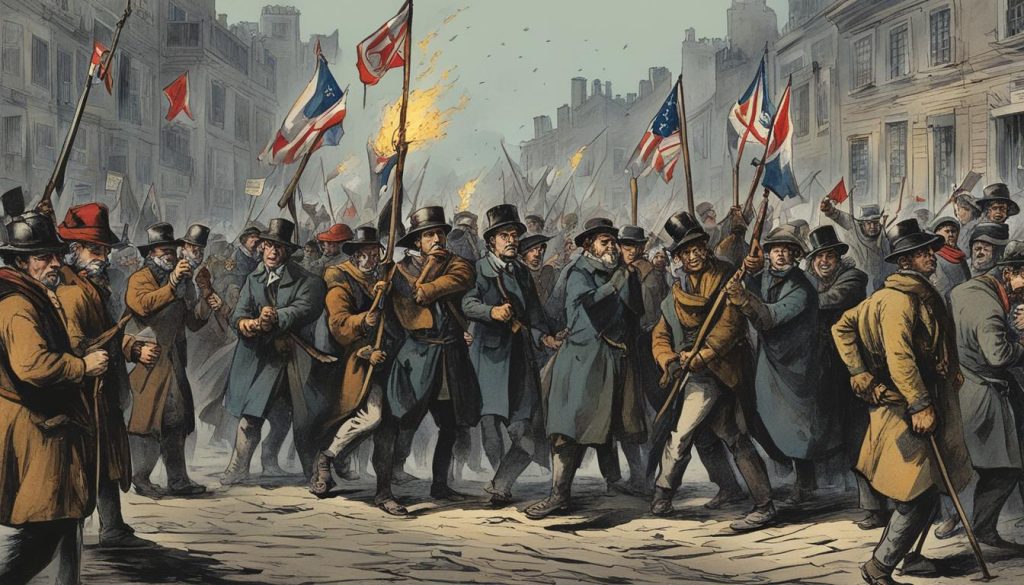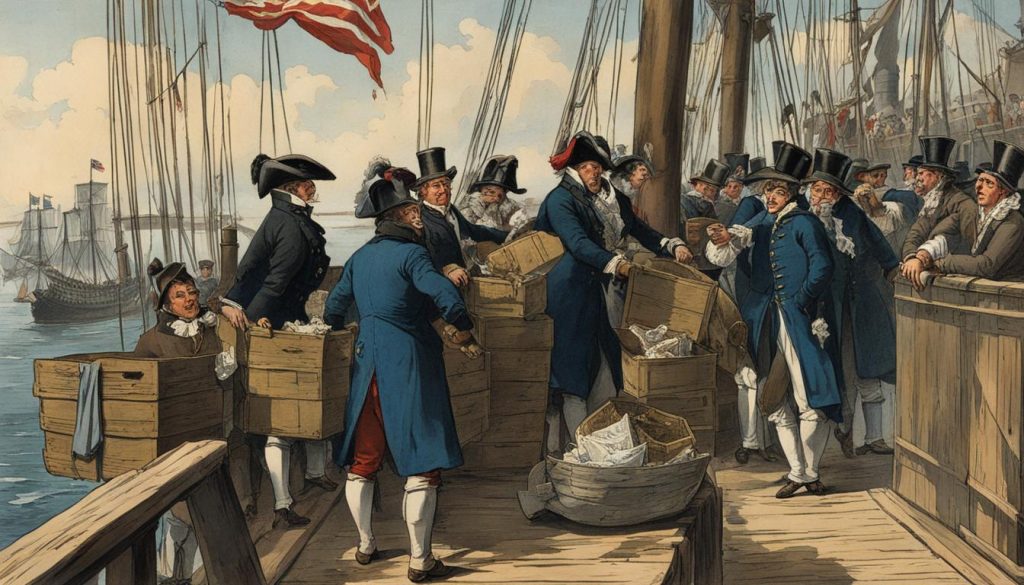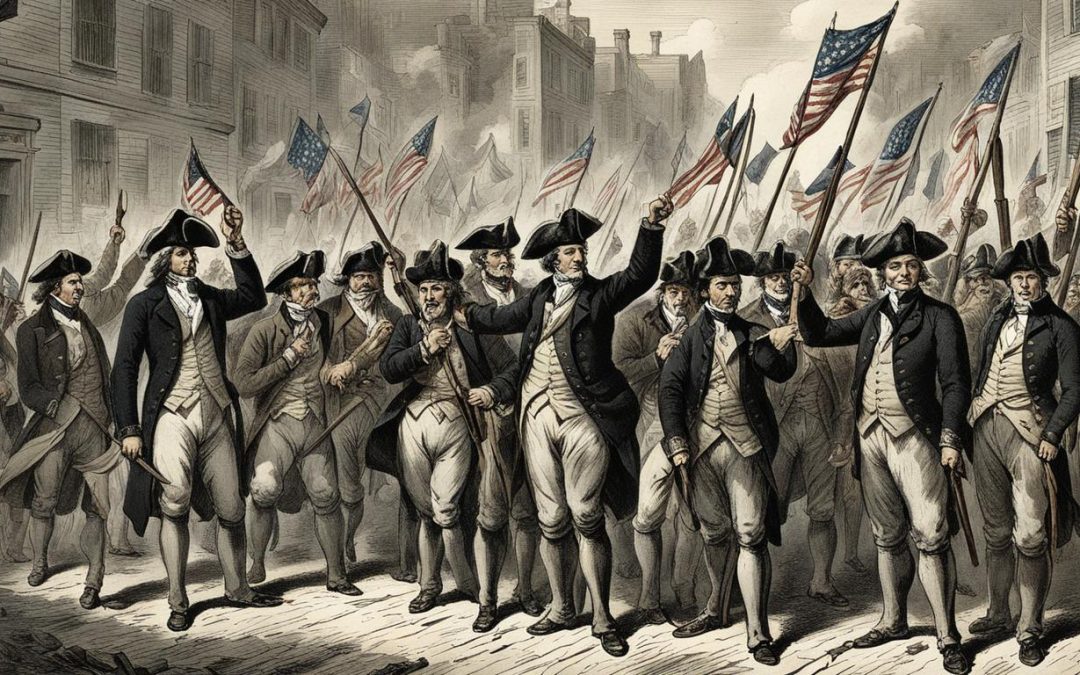The Sons of Liberty, a secret paramilitary political organization, played a crucial role in American colonial resistance against British taxation. On August 14, 1765, this uprising marked a pivotal moment in the fight for independence. The Sons of Liberty, with their motto “No taxation without representation,” organized protests and acts of civil disobedience that challenged British rule.
Key Takeaways:
- The Sons of Liberty, a secret organization, emerged as a response to British taxation in colonial America.
- They were known for recruiting individuals from diverse backgrounds and held clandestine meetings in taverns.
- The Sons of Liberty’s first major action was the protest against the Stamp Act on August 14, 1765.
- They were instrumental in galvanizing support for the cause of American independence.
- The Sons of Liberty’s most enduring action was the Boston Tea Party, which symbolized the colonists’ determination to resist British rule.
The Founding and Structure of the Sons of Liberty

The exact founding of the Sons of Liberty remains uncertain, but it is believed that both the Boston and New York chapters were established simultaneously, working together as an underground network. This organization may have evolved from smaller, like-minded groups such as the Boston Caucus Club and Loyal Nine. Key figures, including Samuel Adams, are often credited as leaders of the Sons of Liberty.
The Sons of Liberty relied on secrecy to protect their activities, holding meetings under iconic landmarks. In Boston, they gathered under the Liberty Tree, while in New York, they met by the Liberty Pole. These locations provided them with a sense of unity and strength as they strategized and planned their opposition against British colonial rule.
The image above showcases the role of the Sons of Liberty in American history.
The Sons of Liberty and the Stamp Act Protest
The Sons of Liberty wasted no time in taking action against the Stamp Act. On August 14, 1765, in the heart of Boston, they gathered under the iconic “Liberty Tree” to express their vehement opposition. Their main target was Andrew Oliver, the man responsible for enforcing the Stamp Act in Massachusetts.
With conviction and determination, the Sons of Liberty paraded Oliver’s effigy through the streets, igniting the passions of the colonists. The protest didn’t stop there – Oliver’s property was destroyed, sending a clear message to the British authorities.
But the Sons of Liberty didn’t limit their protests to Andrew Oliver alone. They targeted others associated with the detested Stamp Act, such as Thomas Hutchinson, the Lieutenant Governor of Massachusetts. These relentless acts of defiance put immense pressure on the British government, ultimately leading to the repeal of the Stamp Act.
“No taxation without representation.”
The Sons of Liberty and their powerful demonstrations reshaped the course of history, demonstrating the colonists’ determination to resist unjust British taxation. Through their actions, they paved the way for future resistance movements and became symbols of American colonial defiance.
Stamp Act Protest Targets
| Name | Position |
|---|---|
| Andrew Oliver | In charge of enforcing the Stamp Act in Massachusetts |
| Thomas Hutchinson | Lieutenant Governor of Massachusetts |
The Sons of Liberty and the American Revolution
As tensions in the American colonies continued to grow, chapters of the Sons of Liberty emerged throughout the Thirteen Colonies, including New England, Virginia, and the Carolinas. These dedicated patriots played a vital role in orchestrating effective resistance movements against British rule, employing various strategies such as protests, boycotts, and the stockpiling of arms.
The Sons of Liberty’s commitment to colonial independence and their relentless efforts to fight against British oppression galvanized support among the colonists. By organizing boycotts of British goods and leading acts of civil disobedience, they demonstrated the indomitable spirit of the American people in their pursuit of freedom.
The Sons of Liberty’s advocacy for American independence reached its climax with the outbreak of the Revolutionary War in 1775. Their active involvement in local militias and their use of guerrilla warfare tactics greatly contributed to the success of the American Revolution. Through their resilience and determination, the Sons of Liberty played a significant role in the birth of a new nation.
Following the Revolutionary War, the Sons of Liberty disbanded as the United States established a new government. However, their legacy continued to inspire future generations, serving as a reminder of the courage and sacrifice required to secure liberty.
The Contributions of the Sons of Liberty
The Sons of Liberty’s impact on the American Revolution cannot be overstated. Their strategic resistance movements, including boycotts and protests, challenged British authority and paved the way for armed conflict. They played a crucial role in unifying the colonists, fueling their desire for independence and bolstering their resolve.
Additionally, the Sons of Liberty were instrumental in galvanizing public support for the cause of American independence. Their persuasive speeches, influential writings, and passionate advocacy successfully swayed public opinion, engaging people from all walks of life in the fight for freedom.
Furthermore, the Sons of Liberty’s dedication to upholding the rights and principles of the American people established a precedent for future resistance movements around the world. Their methods of nonviolent protest and civil disobedience served as inspiration for future leaders and activists, shaping the course of history.
| Key Contributions of the Sons of Liberty: |
|---|
| Organization of effective resistance movements against British rule |
| Advocacy for American independence through boycotts and protests |
| Active participation in local militias during the Revolutionary War |
| Utilization of guerrilla warfare tactics against British forces |
| Inspiration for future resistance movements worldwide |
The Sons of Liberty’s contributions to the American Revolution and their lasting legacy as champions of liberty continue to resonate today. Their unwavering commitment to freedom serves as a timeless reminder of the power of ordinary individuals united in the pursuit of a just cause.
The Boston Tea Party and the Sons of Liberty

The most significant and enduring action taken by the Sons of Liberty was the Boston Tea Party, which occurred on December 16, 1773. Led by Samuel Adams, the Sons of Liberty boarded British ships in Boston Harbor and dumped chests of tea into the water, protesting against British taxation.
“The destruction of the tea is so bold, so daring, so firm, intrepid, and inflexible, and it must have so important consequences, and so lasting, that I cannot but consider it as an epocha in history.”
This event became a catalyst for the start of the Revolutionary War, as it demonstrated the colonists’ determination to resist British rule and their willingness to take direct action. The Boston Tea Party is often considered a pivotal moment in American history and a symbol of the fight for independence.
Sons of Liberty Quote:
“Gentlemen, we must all hang together or assuredly we shall all hang separately.”
The Legacy and Impact of the Sons of Liberty
The Sons of Liberty played a crucial role in shaping the course of the American Revolution and leaving behind a lasting legacy. Their actions, including the Stamp Act protest and the Boston Tea Party, not only united the colonies in their opposition to British rule but also served as an inspiration for other resistance movements throughout American history.
One of the most significant impacts of the Sons of Liberty was their ability to galvanize colonial support against British taxation. Through their protests, boycotts, and acts of civil disobedience, they demonstrated the power of collective action in challenging oppressive policies and defending the rights of the American colonists. The Sons of Liberty effectively mobilized a wide range of individuals from different walks of life, fostering a sense of unity among the colonists.
The Sons of Liberty laid the groundwork for the establishment of the Committees of Safety, whose primary purpose was to coordinate resistance efforts during the Revolutionary War. These committees continued the organizing efforts of the Sons of Liberty and played an integral role in fostering a sense of unity and cooperation among the colonies, further strengthening the fight for independence.
Although the Sons of Liberty disbanded after the Revolutionary War, their legacy endured. They remain a symbol of American colonial resistance and the indomitable spirit of those who fought for freedom. The Sons of Liberty’s impact can still be felt today, reminding us of the importance of preserving individual rights and standing up against injustice.
Conclusion
The Sons of Liberty were instrumental in the resistance against British taxation and the fight for American independence. Through their organized protests, boycotts, and acts of civil disobedience, they played a pivotal role in shaping the course of history. The Sons of Liberty symbolize the power of grassroots movements and serve as a reminder of the American colonists’ determination to secure their rights and liberties.
Their legacy as a symbol of American colonial resistance endures, reminding us of the crucial role they played in the Revolutionary War and the birth of the United States. Inspired by their actions, other resistance movements emerged, laying the foundation for the establishment of the Committees of Safety, which further propelled the cause of American independence.
The Sons of Liberty’s impact reverberates through time, reminding us of the significance of organized grassroots movements in effecting historical change. Their unwavering commitment to the principles of freedom and self-governance continues to inspire generations, reinforcing the importance of preserving the hard-fought rights and liberties that we enjoy today.
FAQ
What was the Sons of Liberty uprising on August 14, 1765?
The Sons of Liberty uprising on August 14, 1765, was a protest organized by the Sons of Liberty in response to the Stamp Act. It involved the gathering of colonists under the “Liberty Tree” in Boston, where they protested against Andrew Oliver, who enforced the Stamp Act in Massachusetts. The protest included parading Oliver’s effigy through the streets and the destruction of his property.
How were the Sons of Liberty founded and structured?
The exact origins of the Sons of Liberty are uncertain, but records indicate their existence as early as 1765 in Boston and New York. They likely evolved from smaller groups like the “Boston Caucus Club” and “Loyal Nine.” The organization operated as a secret paramilitary political organization, recruiting individuals from all walks of colonial society and holding meetings in taverns. Key figures like Samuel Adams are often credited as leaders of the Sons of Liberty.
What role did the Sons of Liberty play in the Stamp Act protest?
The Sons of Liberty played a significant role in organizing and carrying out the Stamp Act protests. They targeted officials associated with the Stamp Act, such as Andrew Oliver and Thomas Hutchinson, through public protests and acts of civil disobedience. These protests put pressure on the British government, contributing to the eventual repeal of the Stamp Act.
How did the Sons of Liberty contribute to the American Revolution?
The Sons of Liberty were instrumental in organizing effective resistance movements against British rule in the Thirteen Colonies. They played a vital role in galvanizing colonial support for the cause of American independence through protests, boycotts, and the stockpiling of arms. Their actions laid the groundwork for the outbreak of the Revolutionary War.
What was the significance of the Boston Tea Party led by the Sons of Liberty?
The Boston Tea Party, led by Samuel Adams and the Sons of Liberty, was a crucial event in American history. It involved the boarding of British ships in Boston Harbor and the dumping of tea into the water as a protest against British taxation. The Boston Tea Party became a catalyst for the start of the Revolutionary War, showcasing the colonists’ determination to resist British rule and their willingness to take direct action.
What is the legacy and impact of the Sons of Liberty?
The Sons of Liberty made a lasting impact on the history of the American Revolution. Their actions, including the Stamp Act protest and the Boston Tea Party, helped unite the colonies against British rule and inspired other resistance movements. The Sons of Liberty laid the groundwork for the establishment of the Committees of Safety, which continued their organizing efforts during the revolution. Their legacy serves as a symbol of American colonial resistance and the fight for independence.
What is the conclusion regarding the Sons of Liberty and American colonial resistance?
The Sons of Liberty played a significant role in the resistance against British taxation and the fight for American independence. Their organized protests, boycotts, and acts of civil disobedience ultimately led to the Revolutionary War and the birth of the United States. The Sons of Liberty remain an important part of American history and serve as a reminder of the power of organized grassroots movements in shaping historical events.



